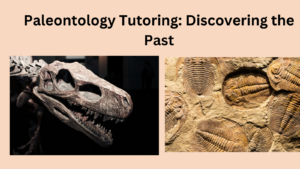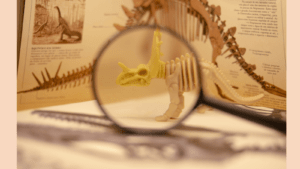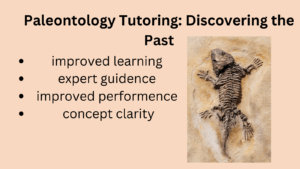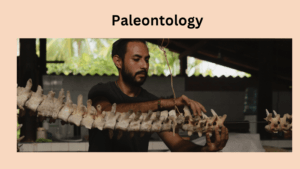
Unlock the Secrets of Earth’s History with Paleontology Tutoring
Paleontology, the fascinating study of ancient life through fossils, offers a captivating glimpse into Earth’s history. For students intrigued by dinosaurs, prehistoric plants, and ancient ecosystems, a solid understanding of paleontology is crucial. Yet, mastering the intricate concepts and theories in this field can be challenging.
This is where paleontology tutoring can make a significant impact. Personalized tutoring not only deepens your understanding of paleontology but also enhances essential research skills, preparing you for future academic and career opportunities in related fields. By engaging with a skilled tutor, you can make the study of our planet’s past both accessible and exciting.
In this blog, we’ll delve into the many benefits of paleontology tutoring, the skills it fosters, and how it can enrich your academic journey. Discover how tailored support can help you unlock the secrets of ancient life and fuel your passion for the sciences.
1. Fossil Discovery and Analysis
Paleontologists study fossils, which are the preserved remains or traces of ancient organisms. Fossils can include bones, teeth, shells, and even imprints of soft tissues. Fieldwork often involves excavating these specimens from sedimentary rock layers, which provide clues about the environment in which the organisms lived.
2. Evolutionary Biology
Paleontology plays a crucial role in understanding evolution. By studying the fossil record, paleontologists can trace the lineage of species, understand the development of various traits, and identify extinction events. This helps scientists piece together the evolutionary history of life.
3. Dating Techniques
To understand the timing of evolutionary events, paleontologists use various dating methods. Relative dating compares the age of fossils in different layers of rock, while radiometric dating uses the decay of radioactive isotopes to determine the absolute age of rocks and fossils.
4. Paleoecology
Paleoecology examines ancient ecosystems and how organisms interacted with each other and their environment. By analyzing fossilized plants and animal remains, paleontologists can infer climate conditions, habitat types, and food webs from the past.
5. Taphonomy
This subfield studies the processes of fossilization and what happens to organisms after they die. Taphonomists explore how factors like decay, burial, and environmental conditions affect the preservation of remains.
6. Technological Advances
Modern paleontology benefits from advancements in technology, such as CT scanning, which allows for detailed imaging of fossils without damaging them. Additionally, molecular techniques can help analyze ancient DNA, providing insights into the genetics of extinct species.

Why Choose Paleontology Tutoring?

1. Personalized Learning Experience
One of the most significant advantages of paleontology tutoring is the personalized approach it offers. Every student has unique strengths and weaknesses, and a dedicated tutor can tailor lessons to meet individual needs. This customized instruction helps students better understand complex topics, such as the classification of fossils and evolutionary theories.
| Benefits of Personalized Learning | Description |
|---|---|
| Targeted Instruction | Focus on specific areas of difficulty. |
| Customized Learning Pace | Progress at a speed that suits you. |
| Individual Feedback | Receive tailored critiques on assignments. |
2. Deepening Understanding of Complex Concepts
Paleontology involves various scientific disciplines, including biology, geology, and ecology. A tutor can break down these interdisciplinary concepts into understandable segments. For example, students may explore the process of fossilization, the significance of different geological eras, and the evolutionary relationships among extinct species. Using engaging resources like fossil models and interactive software, tutors can enhance the learning experience.
3. Enhanced Research Skills
A strong foundation in paleontology requires effective research skills. Tutors can guide students in utilizing scientific literature, analyzing fossil evidence, and understanding paleontological techniques. This includes skills such as fieldwork methodologies, laboratory analysis, and proper documentation of findings.
| Research Skills Developed | Impact |
|---|---|
| Critical Thinking | Analyze and evaluate fossil evidence. |
| Scientific Literacy | Understand and interpret research papers. |
| Data Analysis | Learn to work with paleontological data. |
4. Flexible Scheduling
Online tutoring provides flexibility that traditional classrooms often lack. Students can schedule sessions at times that work best for their busy lifestyles, whether it’s early morning or late evening. This flexibility not only helps students stay committed but also reduces stress, allowing for a more productive learning environment.
5. Access to a Wealth of Resources
A qualified paleontology tutor can introduce students to a variety of educational tools, including:
- Interactive databases for fossil identification, such as the Paleobiology Database.
- Virtual field trips to significant paleontological sites, allowing students to explore locations like the Badlands or La Brea Tar Pits from home.
- Supplementary reading materials, including articles, documentaries, and educational videos that provide deeper insights into paleontological research.
6. Preparing for Future Opportunities
Engaging with a paleontology tutor can also prepare students for advanced studies or careers in related fields. Whether pursuing geology, biology, or environmental science, a strong understanding of paleontological concepts can provide a competitive edge. Tutors can offer guidance on relevant courses, internships, and research opportunities that align with students’ career goals.
| Career Opportunities in Paleontology | Description |
|---|---|
| Paleontologist | Conduct research on fossils and ancient life. |
| Museum Curator | Manage collections and educate the public. |
| Environmental Consultant | Apply paleontological knowledge to conservation efforts. |
| Academic Researcher | Contribute to scientific studies and publications. |
7. Building a Network
Tutoring also provides opportunities for students to connect with professionals in the field. Tutors often have extensive networks and can guide students toward internships, conferences, and workshops that enhance learning and career prospects.
External Resources for Further Learning
For students eager to expand their knowledge, here are some valuable external resources:
- Smithsonian National Museum of Natural History: Paleontology
- Paleontology Portal
- Coursera: Introduction to Paleobiology
- National Geographic: Dinosaurs

Conclusion
Paleontology tutoring offers an invaluable opportunity for students eager to explore the depths of Earth’s history. With personalized instruction, enhanced research skills, and access to diverse resources, tutoring can pave the way for academic success. At TutorLinkers, we connect students with experienced paleontology tutors who can help illuminate the past and inspire a lifelong passion for science. Explore our Paleontology Tutoring page to find the right tutor for you.
Embarking on a journey into paleontology can be both exciting and challenging. With the right support, you can uncover the secrets of ancient life and gain a deeper appreciation for the natural world. Don’t wait—discover the past with the help of a dedicated paleontology tutor today!



